I don't want to be Joan Didion
yes, yes. Writing about writing.
I sat writing this post for far too long, thinking far too much of myself for writing it. Also about who is going to get mad at this. About who is going to write a vicious takedown of my article. Who is going to be disappointed in my analysis? A hand comes down on my shoulder. I look up. It’s Jemima Kirke. “I think you might be thinking about yourself too much.” Saint Jemima is right. I am. I am a young nobody, living in a nowhere town, from a basic part of Brooklyn. I seriously doubt Rolling Stones is going to feel the shockwaves of this post. This is simply the written truth of one particular young nobody.
Joan Didion is always a good read, but not because I can relate to her. She’s a very different kind of woman with a different life experience than I. She’s from a different era, a different tax bracket, a different race, and a different life experience than I. When reading her books, they smell like the cigarette fragranced air of the ’60s. I’m interested in it, but it’s still mostly foreign to me. It’s also a specific lived experience written in 60s prose. Everything about Didion, and the world she illustrates in those books, screams 60s and 70s. In the white album, she speaks of the unease of life after the Manson murders. The people who would come and go carelessly from her house— something she didn’t feel weary of until the events of that summer. She speaks of proper mansions with drawing tables in the bathroom, and the nascense of the black panthers.
I often delight in googling many of Didion’s references from that period. One such instance is Didion describing a man saying he was to deliver Chicken Delight to her home; a chain I had never heard of until that page of the White album. This feeling permeates through a lot of Didion’s work, and a lot of content that exists about her in general. I can’t help but smirk a little when I see a photo of Didion smoking in the same room as her young daughter; something that would be met with outrage and disdain today and yet was completely normal back then. Very 60’s.
The white album, and slouching toward Bethlehem feel like perfect time capsules from that period. Both in prose and in content. They are riveting pieces that remind you of what a conversation with your grandmother might’ve been like back then. The beauty in Didion’s work often lies in the fixed perspective; the knowledge she has or lack thereof in the situations she writes about. The opinions she has and chooses to share. Stories that were written in what was the present at that time, that we the reader, can contextualize and expand upon given everything that has happened since, and all the knowledge we have garnered. What were The Doors like? Were there any clues that Jim Morrison would go down the path he did? We hear of these initial meetings with Huey P. Newton from prison, knowing full well the impact the Black Panthers would have from that point on; when Didion herself was uncertain. These stories age beautifully like a vintage wine; the march of time giving it its potency.
Didion had a talent for finding good stories. She was a woman of her time and had her finger fully on the pulse of the 60s and 70s. Everything she does, from the prose she uses, and the experiences she writes about belongs to that time. These are things that are interesting to revisit but don’t necessarily make me feel as if they belong to me. Part of her writing DNA and mine is that she and I were born when we were. My style of speaking reflects the era that I was brought up in, the region I was brought up in, and the friends I grew up with. The things that belong to my generation may share some overlap with Didion, but I would also probably never choose to write about the same things as her. That instinct is not native to me. She writes about not letting strangers in your house. In today’s world, this is always understood as a given. A fact of life.
Didion is sometimes written off as problematic for some of her views back then. Or problematic for the things she chooses not to cover. I don’t find this conversation productive. You have to meet the literature where it’s at and also understand the amount of context you are afforded. She was insightful but not omniscient. Would she have written about the black panthers in the same way, had she known their future? In the years since slouching through Bethlehem, she was critiqued for her lack of representation during her trip down south. This is a modern mindset applied to a book written in a moment that no longer exists. Her lack of representation still tells me something about Didion and probably the population of people back then— as uncomfortable as it is, minority voices were often an afterthought. It’s a flaw of that era, that often weaves itself subtly into many stories, literary and otherwise. Her lack of mention of these topics also provides perspective— to her it wasn’t noteworthy to talk about. That’s a perspective you have to sit with and decide how you feel about it.
Often in her writings, you can sense an apprehension from her when writing about the protests and rebellion of that time. Still, she did her due diligence in capturing the attitude. Both of herself and those around her at that time. Her jailhouse meeting with Huey P. Newton comes to mind as an example of this. A man she was unsure would have a worthwhile legacy. Being wrong, or apprehensive isn’t a crime. In this sort of writing, I’d almost consider it morally neutral. A permanent record of the 60’s stream of consciousness. It can’t be painted over, censored, or white-washed to appeal to sensibilities. It is what it is, and it says what it says. Captured in black ink for all time.
There’s a literary movement right now, that celebrates Didion but also aspires to emulate her. I entered a book club where some of her work was the topic of conversation. Two girls in the circle went on to ask for advice on how they could better write like Didion in their pieces. I offered up my voice in the conversation and asked; “Why would you want to write like her?”. In their opinion, she’s a timeless classic that is relatable to every woman throughout generations. In my opinion, this isn’t even close to being true, though it shouldn’t deter you from her work. I also believe that trying to create literature in her style can’t reliably be done. Especially when factoring in her perspective. To recreate anyone’s voice is a futile attempt, that will bear no fruit. Writing is a very individualistic art form.
There’s also the fact that the perspective we live with today is just... different. For both better and for worse. We don’t smoke in closed spaces with our children. We’ve started to place value in alternative perspectives, whether it be based on race, gender, or sexuality. Everyone’s voice can be heard all the time with the advent of the internet. The digitization of society and the 24-hour news cycle have changed what sticks in the public consciousness. A candidate assassination attempt was recently all but memory-holed, something I can’t imagine would’ve happened in the past.
I quite like many of the changes from this generation myself. More unique voices contribute to the literary scene than ever before. The digitization of society hasn’t always been a bad thing. Every day 5 events garner our attention. Many of us on substack try to capture the ones that we think will be permanently relevant. That will be defining moments for our time. And still, we could be wrong. The things we consider relevant now, may not hold any weight with generations in 50 years. Our best attempts to be good observers of our time involve whatever captures our imagination about the current zeitgeist. Didion happened to be right on many things, and wrong on a few many things. Both paint portraits of her, and to some degree, of that era. The best way we can emulate Didion, or even come close to it, is to try to time-capsule our own lives. To find what is relevant about our way of life now, and try to let it get old dated like a fine wine. I don’t think I will ever write like Joan Didion, Eve Babitz, or Sylvia Plath. It’s not a way of thinking that’s native to me. I also don’t think I want to. Didion is pleasantly dated. I hope to be pleasantly dated someday as well.



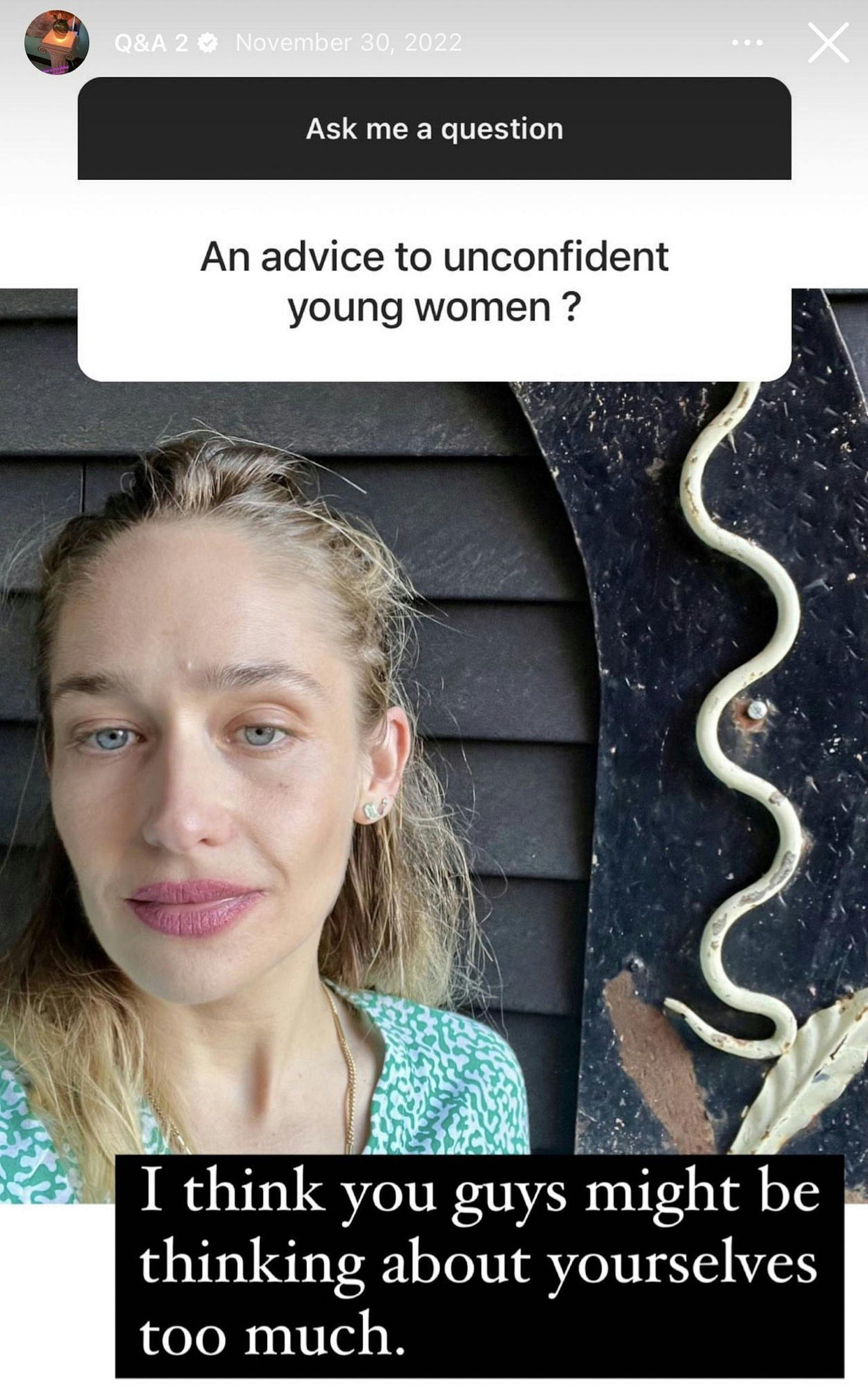
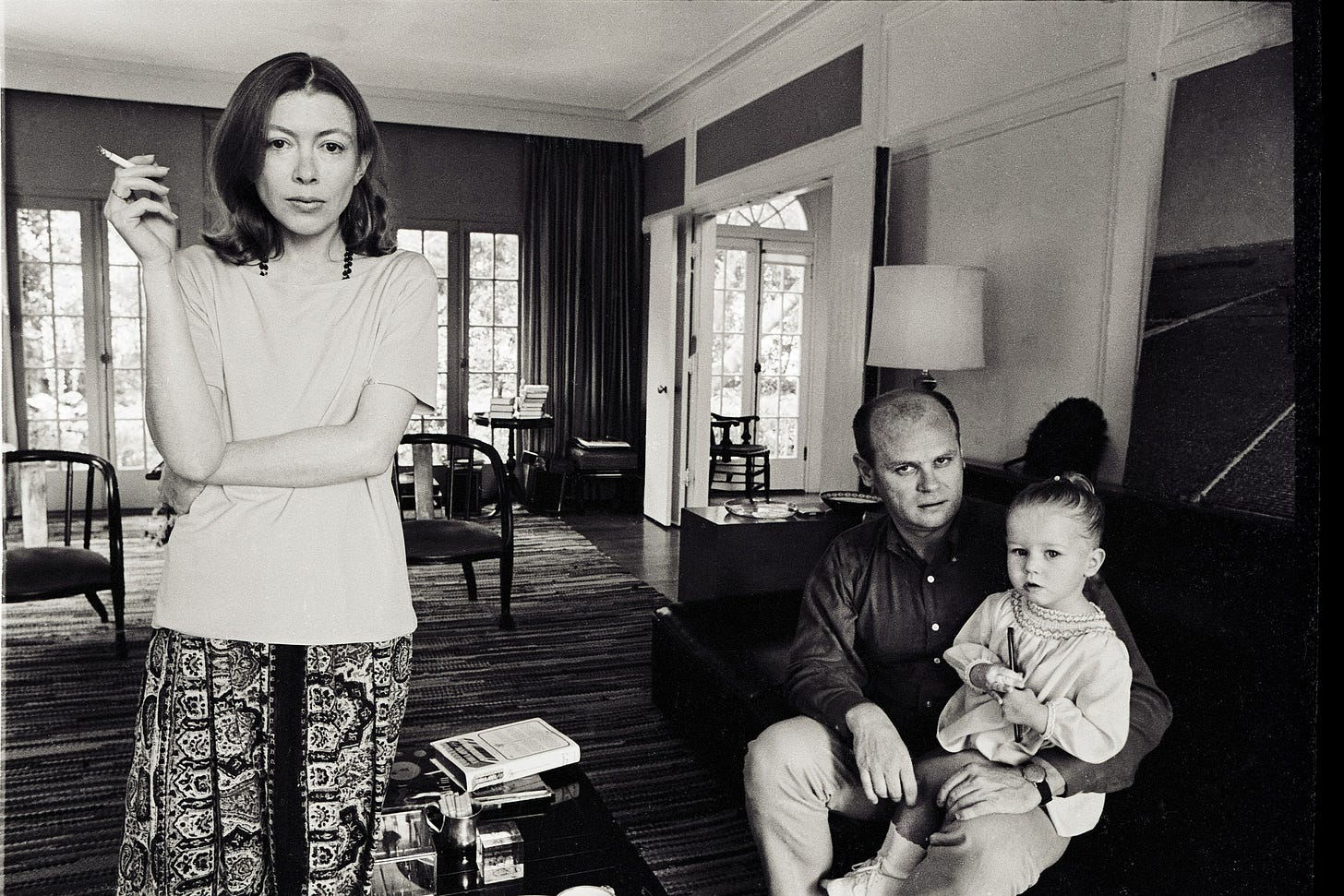
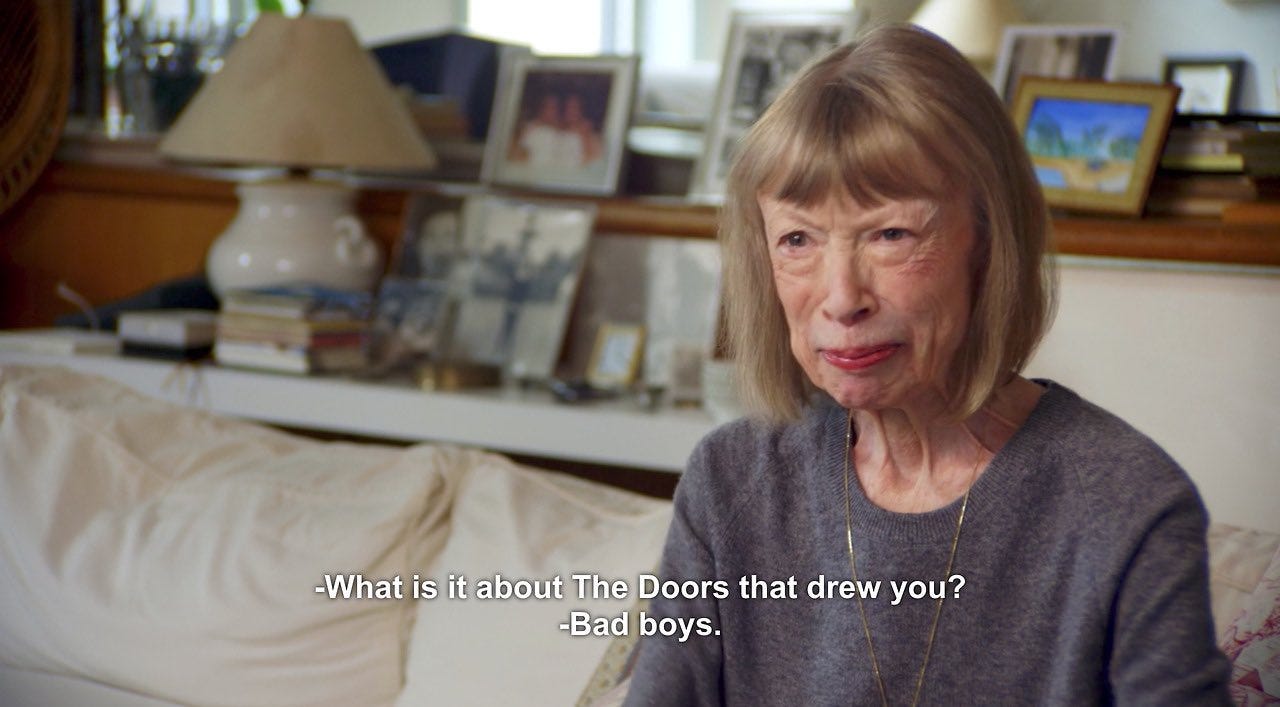
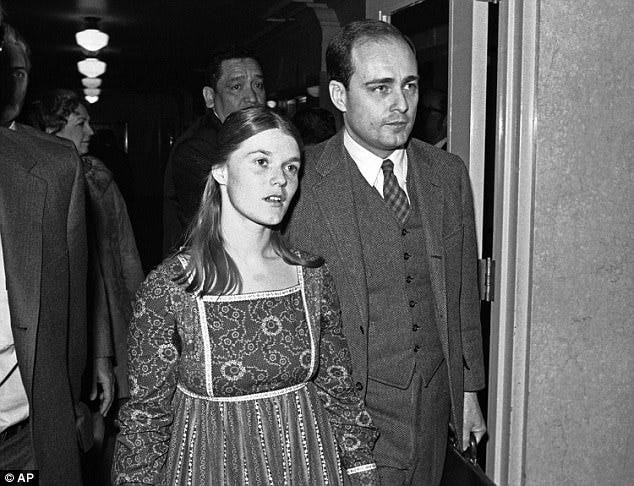
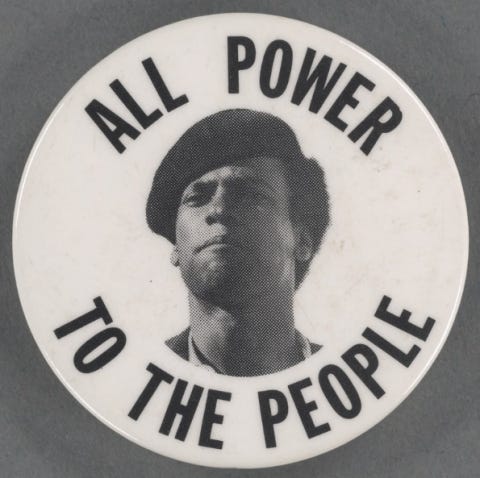
Hi! I found you through the Substack post - I, too, have been writing and thinking about Didion recently. I used to be a superfan based on having read The Year of Magical Thinking, Blue Nights, Play It As It Lays and Slouching Towards Bethlehem. After spending the month attempting to read some of her fiction (could not even finish) and more of her nonfiction... I would now describe myself as someone who appreciates her personal essays and memoirs, less so her fiction and political/cultural criticism which I find self-centered and borderline mean.
I keep thinking that if she were young today, she would definitely have had a Tumblr.
I’ve just come here from Unknown Literary Canon’s ‘The Heretical Feminist Worship worship of Joan Didion and Alice Munro’ and absolutely loved this piece too, you both come at Didion from slightly different angles but expound your thinking with such nuance — feeling very literarily nourished, thank you :)